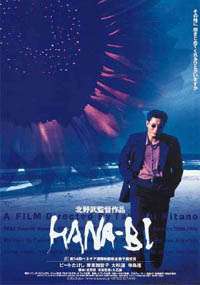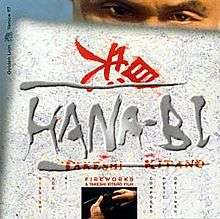Hana-bi
Hana-bi (はなび, Hana-bi), released in the United States as Fireworks, is a 1997 Japanese crime drama film written, directed and edited by Takeshi Kitano, who also stars in it.[2] The film's score was composed by Joe Hisaishi in his fourth collaboration with Kitano. Hana-bi (花火, Hanabi) is the Japanese word for "fireworks."
| Hana-bi | |
|---|---|
 Theatrical release poster | |
| Directed by | Takeshi Kitano |
| Produced by | Masayuki Mori Yasushi Tsuge Takio Yoshida |
| Written by | Takeshi Kitano |
| Starring | |
| Music by | Joe Hisaishi |
| Cinematography | Hideo Yamamoto |
| Edited by | Takeshi Kitano Yoshinori Oota |
Production company |
|
| Distributed by |
|
Release date |
|
Running time | 103 minutes |
| Country | Japan |
| Language | Japanese |
| Budget | $2.3 million[1] |
The unexpected international success of Hana-bi, coupled with Sonatine's critical acclaim, established Kitano as one of the foremost Japanese filmmakers of his time.
Synopsis
Yoshitaka Nishi (Takeshi Kitano) is a violent former police detective who had to retire after a tragic accident during an arrest: another detective, Tanaka, was killed by the suspect, while two other detectives, Nakamura and Horibe, were severely injured. Becoming unemployed, Nishi spends most of his time taking care of his sick wife Miyuki (Kayoko Kishimoto), who has leukemia. To pay for his wife's care, Nishi borrows money from the yakuza, but is having difficulty repaying them.
Meanwhile, Horibe, whom the accident left in a wheelchair, experiences a deep depression. His marriage quickly breaks up, so now he lives alone. In a conversation with Nishi, Horibe hints he considered committing suicide, while adding that he would like to paint but cannot afford to buy himself the necessary materials. Nishi buys him the art supplies, mailing them to him. Horibe then takes up painting and creates surrealistic works of art eventually in a pointillist style.
Nishi buys a second-hand taxi cab and repaints it in police colors. He arms himself with a revolver and robs a bank dressed as a policeman. Using the money, he pays off the yakuza and gives some to Tanaka's widow. Nakamura learns about the gift, advising her to keep the money. He also learns about the paints for Horibe and soon understands who committed the robbery.
Meanwhile, even though Nishi has paid his debt to them, the yakuza guess who may be behind the robbery and chase Nishi to extort additional money from him. Eventually, the gangsters find Nishi, but he kills them all in a violent shootout. At the same time, Nishi is found by Nakamura and a second detective, who want to arrest him for the robbery. Nishi asks Nakamura to spare him a moment of time and sits down on the beach next to his wife. Two gunshots are heard off camera, but the film doesn't reveal who was shot.
Cast
- Takeshi Kitano as Yoshitaka Nishi
- Kayoko Kishimoto as Miyuki, Nishi's wife
- Ren Osugi as Horibe
- Susumu Terajima as Nakamura
- Tetsu Watanabe as Tesuka
- Hakuryu as Yakuza Hitman
- Yasuei Yakushiji as Criminal
- Taro Itsumi as Kudo
- Kenichi Yajima as Doctor
- Makoto Ashikawa as Tanaka
- Yūko Daike as Tanaka's widow
Production
Horibe takes up painting in the pointillist style in order to compensate for his paralysis. In reality, these paintings were painted by Kitano himself, whilst in recovery from an infamous motorcycle accident in August 1994 that left half of his face paralyzed.[3]
Kitano's daughter and former singer, Shoko Kitano, makes a cameo appearance playing a nameless girl flying a kite in the film's closing scenes.
The film's title is sometimes listed as "Hana-bi", "hana-bi" or "Hanabi" on the covers of international DVD releases and other references to the film in the West. However, the official title is actually HANA-BI, fully capitalized,[4][5] and is used on all Japanese licensed products, including theatrical posters, video covers and OST covers.[6]
Soundtrack
| Hana-bi | |
|---|---|
Polydor cover | |
| Soundtrack album by | |
| Released | January 1, 1998 |
| Genre | Soundtrack, modern classical, downtempo |
| Length | 42:14 |
| Label | Polydor, Milan Records |
| Alternative cover | |
 Milan Records cover | |
The soundtrack CD was first released in 1998 and 1999 by Milan Records,[7] then reissued by Polydor.
Track listing
All compositions by Joe Hisaishi.
- "Hana-bi" – 3:42
- "Angel" – 2:41
- "Sea of Blue" – 3:29
- "...and Alone" – 2:29
- "Ever Love" – 2:15
- "Painters" – 5:57
- "Smile and Smile" – 2:55
- "Heaven's Gate" – 4:59
- "Tenderness" – 2:31
- "Thank You... for Everything" – 7:09
- "Hana-bi (Reprise)" – 3:41
Credits
- Bassoon – Shinkichi Maeda
- Clarinet – Tadashi Hoshino
- Composer, arranger, performer – Joe Hisaishi
- Flute – Takashi Asahi, Takeshi Shinohara
- Harmonica – Nobuo Yagi
- Oboe – Hiroshi Shibayama
- Strings – Yuichiro Goto Group
Reception
Although it was not a big success financially,[8] Hana-bi received critical acclaim and won the Golden Lion award at the 54th Venice International Film Festival and numerous other accolades. Kitano himself said it was not until he won the Golden Lion that he was accepted as a serious director in his native Japan; his prior films had been looked at as just the hobby of a famous comedian.[9]
It also won the Grand Prix of the Belgian Syndicate of Cinema Critics.
Review aggregator Rotten Tomatoes reports that 95% of 20 critics have given the film a positive review, with a rating average of 8.3 out of 10.[10] American film critic Roger Ebert rated it three stars out of four, citing its unusual approach toward serenity and brutality, calling it "a Charles Bronson Death Wish movie so drained of story, cliché, convention and plot that nothing is left, except pure form and impulse."[2] Jaime N. Christley of Slant Magazine gave the film a perfect four star rating.[11] David Stratton of The Movie Show called Hana-bi "an unclassifiable film" and "quite extraordinary," with co-host Margaret Pomeranz stating "I was ultimately so moved by it. It did what cinema is meant to do, for me anyway, and that's take me on a journey that is mine, that ultimately ends up inside me, in my heart." Stratton concluded that Hana-bi is "hard to describe to audiences, but all I can say is: Go and see it. It's great." The duo both awarded the film five stars out of five.[12]
The film is included in the book 1001 Movies You Must See Before You Die.[13]
References
- Kitano, Takeshi, Fireworks DVD booklet, 1998, New Yorker Films. Retrieved 2015-12-26
- Ebert, Roger (March 20, 1998). "Fireworks". Chicago Sun-Times. Retrieved 2009-07-30.
- "A Gallery". Fireworks (DVD). New Yorker Films. 1998.
- Official website at Office Kitano Archived 2006-05-14 at the Wayback Machine
- Hana-bi at the Japanese Movie Database (in Japanese)
- Office Kitano movie posters Archived 2006-12-12 at the Wayback Machine
- "Joe Hisaishi – Hana-Bi (Music From The Motion Picture)". Discogs. Retrieved 5 September 2018.
- "Midnight Eye interview: Takeshi Kitano". midnighteye.com. 2003-11-05. Retrieved 2015-12-26.
- "Takeshi Kitano Interview". The A.V. Club. 2004-08-11. Retrieved 2015-12-26.
- "Fireworks (Hana-bi) (1997)". Rotten Tomatoes. Flixster. Retrieved 2015-12-26.
- "Fireworks". Slant Magazine. 2004-07-07. Retrieved 2015-12-26.
- "The Movie Show Reviews Hana-bi". SBS. 1998-09-02. Retrieved 2018-07-01.
- 1001 movies you must see before you die. Schneider, Steven Jay, 1974-. London. [England]: Cassell Illustrated/Quintet Books. 2003. ISBN 184403044X. OCLC 223768961.CS1 maint: others (link)
External links
- Hana-bi on IMDb
- Hana-bi at AllMovie
- Hana-bi at the Japanese Movie Database (in Japanese)
- Hana-Bi at Rotten Tomatoes